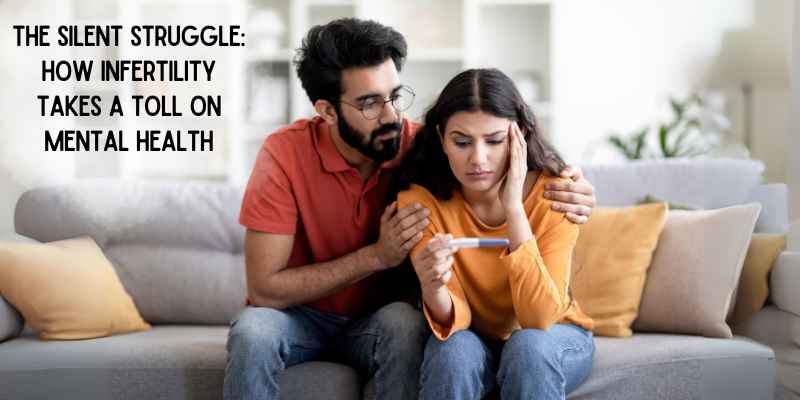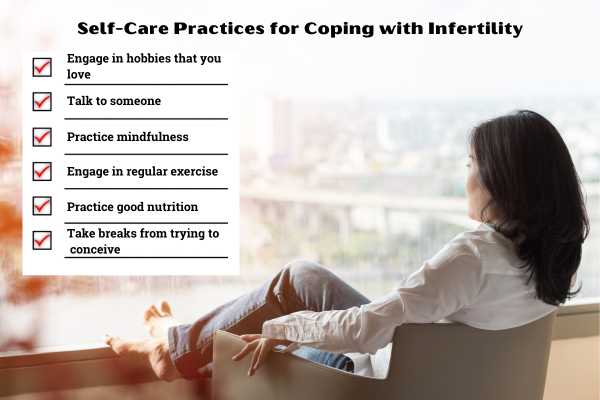Struggling with infertility can be an isolating and heart-wrenching journey that takes an unseen toll on mental health. The emotional rollercoaster of longing for a child coupled with the disappointment of failed attempts can leave couples feeling broken and overwhelmed. In a society that often idealizes parenthood and places immense pressure on individuals to conceive, those grappling with infertility may feel a sense of shame or inadequacy, further exacerbating their emotional distress.
The silent struggle of infertility can lead to a range of mental health challenges, including anxiety, depression, and feelings of grief and loss. The constant cycle of hope and disappointment can significantly affect one’s self-esteem and overall well-being. It’s important to recognize that infertility affects both men and women, and the emotional impact can strain relationships and create tension within the partnership. Seeking support from loved ones, counselling, or support groups can help individuals and couples navigate the complex emotions associated with infertility and promote mental well-being throughout the journey.
In this article, we explore the often-overlooked impact of infertility on mental health, providing insights into the challenges faced by individuals and couples struggling to conceive. We also discuss strategies and resources to support those experiencing this silent struggle.
Understanding Infertility
Struggling with infertility can be an isolating and heart-wrenching journey that takes an unseen toll on mental health. The emotional rollercoaster of longing for a child coupled with the disappointment of failed attempts can leave couples feeling broken and overwhelmed. In a society that often idealizes parenthood and places immense pressure on individuals to conceive, those grappling with infertility may feel a sense of shame or inadequacy, further exacerbating their emotional distress.
The silent struggle of infertility can lead to a range of mental health challenges, including anxiety, depression, and feelings of grief and loss. The constant cycle of hope and disappointment can significantly affect one’s self-esteem and overall well-being. It’s important to recognize that infertility affects both men and women, and the emotional impact can strain relationships and create tension within the partnership. Seeking support from loved ones, counselling, or support groups can help individuals and couples navigate the complex emotions associated with infertility and promote mental well-being throughout the journey.
The Emotional Impact of Infertility
Infertility is a medical condition that affects millions of people worldwide. It is defined as the inability to conceive after a year of regular, unprotected intercourse. While infertility can be caused by various factors, such as hormonal imbalances, reproductive organ abnormalities, or genetic disorders, the emotional toll it takes is often overlooked. Couples facing infertility may find themselves grappling with feelings of inadequacy, guilt, and shame. The societal expectation of parenthood can create additional pressure and make the journey even more challenging.
Infertility can be a complex issue, and it’s essential to approach it with empathy and understanding. Recognizing that infertility is not a reflection of personal worth or failure is crucial. It is a medical condition that requires support and understanding from both the individual experiencing it and their loved ones. By educating ourselves about infertility and its emotional impact, we can create a more compassionate and inclusive society.
How Infertility Affects Mental Health
The emotional impact of infertility can be profound and far-reaching. The repeated disappointment of failed attempts to conceive can lead to feelings of sadness, frustration, and hopelessness. Individuals and couples may experience a sense of grief and loss for the family they had envisioned. The constant longing for a child can create a sense of emptiness and longing, which can be emotionally draining.
Moreover, the pressure to conceive within a specific timeframe, societal judgment, and well-intentioned but often intrusive questions from friends and family can add to the emotional burden. Infertility can also trigger feelings of inadequacy, as individuals may compare themselves to others who have successfully conceived. The emotional impact of infertility is not limited to the person experiencing it; it can strain relationships and create tension within couples, families, and friendships.
Coping Mechanisms and Support for Individuals Experiencing Infertility
Infertility can have a profound impact on mental health, leading to conditions such as anxiety and depression. The constant uncertainty and disappointment can trigger excessive worry and anxiety about the future. The fear of never being able to conceive can be overwhelming and can consume the individual’s thoughts, affecting their ability to focus, sleep, and engage in daily activities.
Depression can also be a common response to infertility, as individuals may experience feelings of sadness, loss of interest, and a sense of hopelessness. The emotional toll of infertility can erode self-esteem and self-worth, leading to feelings of inadequacy and a negative self-image. It is essential to recognize the signs of anxiety and depression in individuals struggling with infertility and encourage them to seek professional help.
The Role Of Therapy And Counselling In Infertility
While infertility can be emotionally challenging, there are coping mechanisms and support systems that can help individuals navigate this difficult journey. Seeking support from loved ones, friends, or support groups can provide a safe space to share experiences, gain insights, and find comfort in knowing they are not alone. Online communities and forums also offer a platform for individuals to connect with others going through similar experiences and find support and understanding.
Practicing self-care is crucial for individuals experiencing infertility. Engaging in joyful and relaxed activities can help alleviate stress and improve overall well-being. This may include engaging in hobbies, practising mindfulness and meditation, or seeking professional counselling or therapy.
The Impact of Infertility on Relationships
Therapy and counselling can play a vital role in supporting individuals and couples struggling with infertility. Infertility can create complex emotions that may be difficult to navigate alone. Therapists and counsellors can provide a safe and supportive environment for individuals to express their feelings, process grief and loss, and develop coping strategies.
Cognitive-behavioral therapy (CBT) can be particularly effective in helping individuals reframe negative thoughts and develop healthier coping mechanisms. Couples therapy can also help partners communicate and navigate the emotional challenges of infertility together, fostering understanding and strengthening the relationship.
Breaking The Silence: Advocating for Mental Health Support in Infertility
Infertility can strain relationships, as the emotional toll and pressure to conceive can create tension between partners. The constant focus on conceiving can overshadow other aspects of the relationship, leading to feelings of isolation or resentment. Communication breakdowns and misunderstandings may occur as partners struggle to navigate the complex emotions associated with infertility.
However, infertility can also be an opportunity for growth and increased intimacy. By seeking support and attending counselling together, couples can develop practical communication skills, strengthen their emotional bond, and find ways to support each other through the ups and downs of the journey.
Self-Care Practices for Individuals Experiencing Infertility
Infertility is often surrounded by silence and stigma. Many individuals and couples suffer silently, feeling ashamed or embarrassed to discuss their struggles. Breaking the silence and advocating for mental health support in infertility is essential to create a more compassionate and understanding society.
Raising awareness about the emotional impact of infertility can reduce the stigma and encourage open conversations. By educating healthcare professionals, friends, family, and the wider community, we can foster empathy and support for those struggling with infertility. Creating safe spaces where individuals can share their experiences without judgment and receive the support they need is crucial.
Seeking Professional Help: When To Consider Therapy or Counselling
Self-care is crucial for individuals experiencing infertility, as it helps maintain mental and emotional well-being throughout the journey. Engaging in joyful and relaxed activities can help reduce stress levels and promote a positive mindset. This may include practising mindfulness and meditation, engaging in physical exercise or yoga, spending time in nature, or pursuing creative outlets such as painting or writing.
Individuals need to prioritize self-care and set boundaries to protect their emotional well-being. This may involve limiting exposure to triggers, taking social media breaks, and seeking supportive communities that understand and validate their experiences.
Conclusion: Fostering Empathy and Understanding for Those Struggling With Infertility
Seeking professional help is essential for individuals experiencing infertility when their emotional well-being is significantly impacted. If feelings of sadness, anxiety, or hopelessness persist and interfere with daily life, it may be time to consider therapy or counselling. A mental health professional can provide guidance, support, and coping strategies to help navigate the emotional challenges associated with infertility.
Additionally, seeking professional help can be beneficial for couples experiencing relationship strain due to infertility. Couples therapy can provide a safe space for partners to express their feelings, improve communication, and strengthen their bond.
Refrences:
Recognizing the Psychological Toll of Infertility in Women – ADAA
Can Mental Health Be A Silent Battle During Infertility Treatment? – ZEE News














